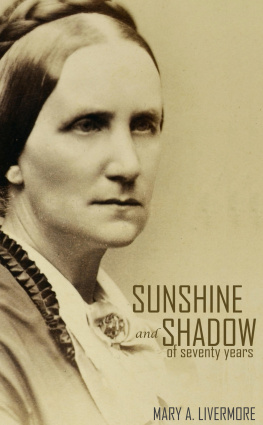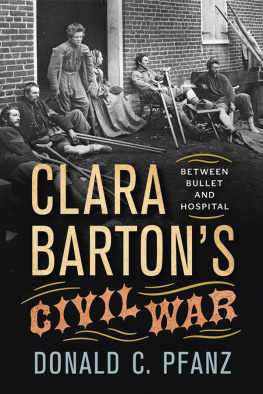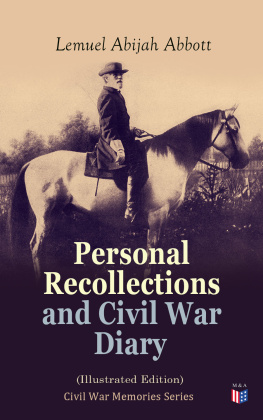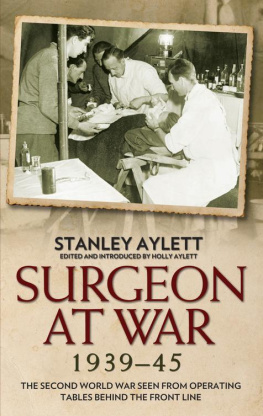

This edition is published by PICKLE PARTNERS PUBLISHING www.picklepartnerspublishing.com
To join our mailing list for new titles or for issues with our books
Or on Facebook
Text originally published in 1889 under the same title.
Pickle Partners Publishing 2013, all rights reserved. No part of this publication may be reproduced, stored in a retrieval system or transmitted by any means, electrical, mechanical or otherwise without the written permission of the copyright holder.
Publishers Note
Although in most cases we have retained the Authors original spelling and grammar to authentically reproduce the work of the Author and the original intent of such material, some additional notes and clarifications have been added for the modern readers benefit.
We have also made every effort to include all maps and illustrations of the original edition the limitations of formatting do not allow of including larger maps, we will upload as many of these maps as possible.
MY STORY OF THE WAR:
Womans Narrative
OF
FOUR YEARS PERSONAL EXPERIENCE
AS NURSE IN THE UNION ARMY, AND IN RELIEF WORK AT HOME,
IN HOSPITALS, CAMPS, AND AT THE FRONT, DURING
THE WAR OF THE REBELLION.
WITH
Anecdotes, Pathetic Incidents, and Thrilling Reminiscences
PORTRAYING
THE LIGHTS AND SHADOWS OF HOSPITAL LIFE
AND
THE SANITARY SERVICE OF THE WAR.
BY
MARY A. LIVERMORE.
TABLE OF CONTENTS
Contents
DEDICATION
TO
THE VICTORIOUS SOLDIERS OF THE UNION ARMY,
HOWEVER CIRCUMSTANCED AND WHEREVER LIVING;
TO
The Honored Memory of the of the Heroic
Dead,
WHO MADE THE SOIL OF THE SOUTH BILLOWY
WITH THEIR GRAVES;
AND TO
MT SURVIVING CO-WORKERS IN THAT NOBLE ORGANIZATION,
THE UNITED STATES SANITARY COMMISSION,
THIS WORK IS DEDICATED.
PREFACE
AT the close of the war, I was importuned to publish my experiences and reminiscences in connection with the hospitals and the relief work of the Sanitary Commission. But I declined to do so. A horror of the war still enwrapped the country. The salvation of the nation had been purchased with the blood of her sons, and she was still in the throes of anguish because of her bereavement. The people had turned with relief to the employments of peaceful life, eager to forget the fearful years of battle and carnage. I put away all mementoes of the exceptional life I had led, and re-entered with gladness upon the duties connected with my home and family, giving my leisure, as before the war, to charitable work and literary pursuits. I expected this quiet and happy order of things would continue to the end.
It has been otherwise ordered. The twenty-odd years that have passed since the bells rang in the long prayer for peace have been unlike any of which I had ever dreamed. They have been packed with work, have brought me in contact with people and events of national importance, have afforded me extended opportunities of travel in my own Country and Europe, and have given me a largeness and variety of experience not often gained by a woman. The sun of my life is now sloping swiftly to the west, the years that I have travelled lie stretching in long array behind me, and I am approaching the time when one lives much in memory. I have again been asked to write for publication my story of the war and its relief work, and this time the request has found me favorably disposed to the undertaking.
The public ear has listened eagerly to the stories of the great battles of the war of the rebellion, told by the master spirits who conducted them, and who led the hosts of freedom to victory. The plan of the campaigns, the division of the forces, and the parts assigned to the various officers in command, the topography of the battle-fields, the personal prowess and heroism developed in the hotly contested struggle, and the jubilant victory which resulted, whose pans of joy drowned the cries of the wounded and the wails of bereavementof these histories the people have not grown weary. Every detail of Fort Donelson and Vicksburg, Antietam and Gettysburg, and the surrender of Appomattox is eagerly sought and devoured with zest. Millions of readers bend over the thrilling autobiographies of Grant, Sherman, Logan, and other great captains of the memorable war, when, on the top wave of a nations righteous wrath with slavery, four million of slaves were lifted to the level of freemen.
But there is a paucity of histories of the private soldier, of sketches of the rank and file. These have not been written, partly because of the modesty of the men whose experiences were worth narrating, and partly because they were not favorably circumstanced for extensive observation. There is a whole world of thrilling and heroic deed and endeavor, of lofty patience, silent endurance and sacrifice, connected with the soldiers of the army, of which the world will always remain ignorant. It cannot be told. Neither can the deeds of nobleness performed by the people who remained at home, and who stood loyally by the government in its every hour of extremity. They measured their ready aid by the nations need, and, in their consecration to the cause of national unity and freedom, outran all outward demands made upon them.
The patriotism of men, the solemn joyfulness with which they gave of their possessions and of themselves, the unfaltering faith which no disaster could shake and no treachery enfeeble, who has told us of these, in detail? Who has fully narrated the consecrated and organized work of women, who strengthened the sinews of the nation with their unflagging enthusiasm, and bridged over the chasm between civil and military life, by infusing homogeneousness of feeling into the army and the people, keeping the men in the field civilians, and making the people at home, of both sexes, half soldiers? It can never be understood save by those who lived through that period, when one year counted more in the history of noble development than a half-score of ordinary years of buying and selling, building and furnishing, visiting and feasting. If this book shall in any way help to supply the deficiency I have indicated, my purpose will be accomplished.
I am largely indebted to my husband and friends for the materials from which this book has been made. My own tendency is to destroy the records of my past, as soon as an event or experience has ended. I have had little taste for preserving records, journals, memoranda, and letters, and am never hampered with this sort of impedimenta. Let the dead past bury its dead! has been one of my cherished mottoes. The duty of the hour, the work of the living present, has enthralled me, rather than contemplation of the past. But, in this instance, what I have been careless of preserving, my kindred and friends have held in trust for me.
For more than a dozen years, covering the entire period of the war, I was associated with my husband in the editorship of his paper, published in Chicago. For its columns I wrote sketches of all events, that were interesting or inspiring, in connection with the Sanitary Commission. Its readers were informed of every phase of its relief work, as soon as it was undertaken, and of its special calls for aid. And when I went to the hospitals on errands connected with the sick, wounded and dying, or made trips into the army in charge of sanitary stores, for whose disbursement I was held responsible, I always corresponded for the press. And no issue of my husbands paper appeared, when I was thus engaged, that did not contain long letters from the front, packed with narrations of facts and events, for which I knew its readers were eagerly looking.
Next page
![Mary Ashton Livermore My Story Of The War: A Womans Narrative Of Four Years Personal Experience As Nurse In The Union Army [Illustrated Edition]](/uploads/posts/book/420175/thumbs/mary-ashton-livermore-my-story-of-the-war-a.jpg)








